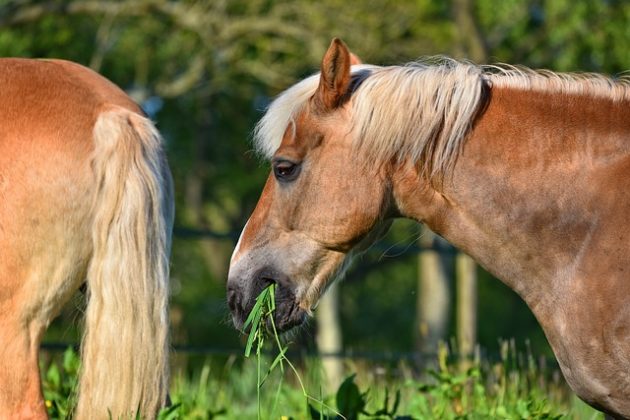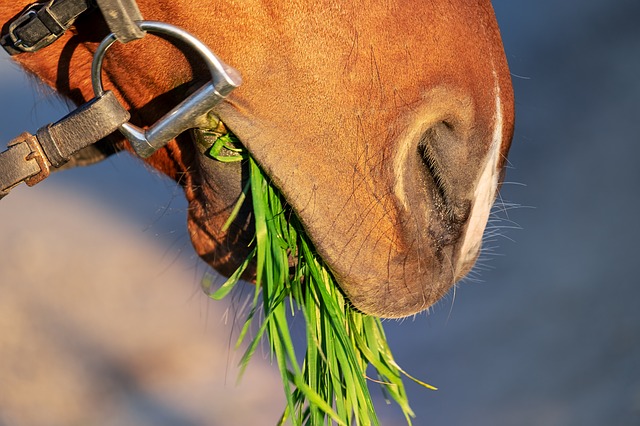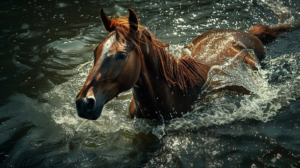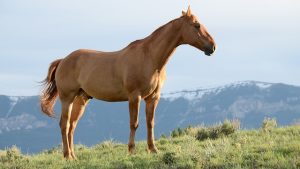Feeding your horse properly is crucial to their health, performance, and overall well-being. Horses’ specific dietary needs vary depending on age, weight, activity level, and health conditions. Understanding the best way to feed horses involves knowledge about equine nutritional needs, the available feed type, and the best feeding practices. In this guide, we’ll delve into the best practices for feeding horses, including the types of feed, feeding schedules, and tips to ensure your horse gets the nutrition it needs.
When it comes to horse care, few aspects are as crucial or as nuanced as feeding. I’ve seen how feeding practices can transform a horse’s health and performance. The belief that “you are what you eat” also holds for horses, making the importance of a well-balanced diet undeniable. I’ve observed that a thoughtfully crafted feeding regimen supports physical health and enhances a horse’s temperament and overall quality of life.
Understanding Equine Nutrition
Horses are herbivores with a digestive system that processes a continuous forage supply. Their diet should primarily consist of roughage (hay or pasture), which provides the necessary fiber for healthy digestion. According to the University of Kentucky’s Equine Research (2021), a horse should consume about 1.5% to 2% of its body weight in forage daily to maintain good health.
- Forage (Hay and Pasture)
- Concentrates (Grains and Pellets)
- Supplements
1. Forage: The Foundation of a Horse’s Diet
Hay
Quality hay is the cornerstone of a horse’s diet. It provides the necessary fiber to maintain a healthy digestive system. Types of hay include:
- Grass Hay: Includes Timothy, Bermuda, and Orchard grass. It’s lower in protein and energy, suitable for most horses.
- Legume Hay: Includes Alfalfa and Clover. It’s higher in protein and calcium, ideal for growing, lactating, or high-performance horses.
Pasture
Fresh pasture can be an excellent source of nutrition. Ensure the pasture is well-maintained and free from toxic plants. Rotational grazing can help keep the pasture healthy and provide consistent nutrition.
2. Concentrates: Energy and Nutrients Boost
Grains
Grains like oats, barley, and corn provide additional energy. They should be fed in moderation, considering the horse’s activity level.
Pelleted and Extruded Feeds
Commercial feeds are formulated to provide balanced nutrition and are often more digestible than whole grains. Choose feeds that match your horse’s specific needs.
3. Supplements: Tailoring the Diet
Supplements can help address specific nutritional deficiencies or health conditions. Common supplements include:
- Vitamins and Minerals: Essential for overall health.
- Electrolytes: Important for horses that sweat heavily.
- Probiotics and Prebiotics: Aid in digestion.
- Joint Supplements: Beneficial for older or performance horses.
Creating a Feeding Schedule
A consistent feeding schedule helps maintain digestive health and reduces stress. Here are some tips:
- Feed Small, Frequent Meals: Horses are natural grazers and do best when they eat small amounts throughout the day.
- Establish a Routine: Feed at the same times every day.
- Monitor Body Condition: Adjust feed based on the horse’s weight, health, and activity level.
Tips for Optimal Feeding
- Clean, Fresh Water: Always provide access to clean water. Horses can drink up to 10 gallons a day.
- Monitor Feed Quality: Ensure hay and grains are mold-free and dust-free.
- Gradual Changes: Introduce any changes to the diet gradually over 7-10 days to prevent digestive upset.
- Avoid Overfeeding: Overfeeding, especially grains, can lead to obesity and other health issues like laminitis.
- Regular Dental Checkups: Ensure your horse’s teeth are checked regularly to prevent feeding difficulties.
Special Considerations
Feeding Senior Horses
Older horses may have different nutritional needs. They might require more easily digestible feed, such as soaked hay cubes or senior-specific pelleted feeds.
Feeding Performance Horses
Horses in intense training or competition require more energy and nutrients. High-quality forage, supplemented with grains and concentrates, is crucial.
Feeding Horses with Health Issues
Horses with conditions like insulin resistance, laminitis, or allergies require specialized diets. Consult with a veterinarian for tailored feeding plans.

Feed Only Good Quality Grain and Hay
- Don’t let your horse eat dusty, moldy, or spoiled feeds. When several horses are to be grained, feeding should be.
- Proceed in routine order and with dispatch.
- The foundation of the ration should be good quality hay, purchased as economically as you can for the type of horse involved. If hay costs are unreasonably high, reduce the hay and increase the grain.
- Buy grain that gives your horse a good energy source at the lowest possible cost. Buy protein on its cost per digestible pound.
- Change rations gradually, allowing your horse to adjust to new feed a little at a time.
- Never over-feed your horse. Horses get fat just like people. And overweight horses can founder.
- Vary grain portions with the amount of work the horse is doing. The harder he works, the more he needs.
- Don’t give a full feed to your horse when he’s hot and tired.
- Give him his grain after his hay.
- Exercise him properly and regularly; that’s just as important 48 as a good diet.
Water
Water works wonders for all animals. We drink it simply because we’re thirsty; your horse does the same thing. But it’s interesting to note some of the miracles that ordinary water performs for us. It dissolves nutrients or carries them in suspension from one part s of the body to another.
It reacts with many chemical compounds; complex food substances are broken into simple ones then combined with water to absorb and utilize them. Water fills the cells and enables animals to hold their shape.
Water is the chief factor in temperature control; when warm-blooded animals become overheated, evaporation cools them. Water has a great capacity for absorbing heat; the watery tissues help to stabilize the temperature.
A mature horse’s body is about 50% water; a newborn colt may be as much as 80% water. An ample supply of good water is essential to your horse’s health. He will drink around 10 to 12 gallons a day.
Warm weather and hard exercise will naturally make him drink more. He will also want additional water if fed legume hay rather than grass hay. Water him at regular times. Under most circumstances, he may drink before, after, and during a meal with no problems.
However, it is not wise to water a horse immediately after graining. When he has been exercising vigorously and is hot, give him only small sips until he cools down.
Salt
Salt is another marvel working inside the bodies of living creatures, including people. It is said to be the most universal food of human beings because we all must have it to live. Horses feel the same way about it.
Salt provides essential sodium and chlorine. It stimulates the secretion of saliva; it promotes the action of enzymes. It maintains the right osmotic pressure in the cells. Sodium maintains the body tissues; chlorine makes the hydrochloric acid in gastric juice. Salt regulates water metabolism and the passage of nutrients into the cells.
The body loses salt not only through urination but also through sweating. Hot weather and heavy exercise call for additional salt. A pound of sweat contains about two grams of salt. Horses normally need about two ounces of salt a day.
The common way of supplying salt is to put out salt blocks which the horse has free access. Salt may also be mixed into the ration; it should be at least one percent of the ration weight, perhaps only half that.
A healthy horse won’t eat excessive salt unless deprived for some time. If there’s a possibility he might eat too much, limit the amount available; otherwise, he may get indigestion. You will have to use your judgment in some matters.
The amount of supplemental salt needed varies with the salt in the feed and water. In some areas near the ocean, horses are said to need no supplemental salt at all.
Overfeeding
Horses can get fat. If you’re an average American citizen, you may have had the problem yourself or know many people who have. Obesity can be serious in a horse. In a young, growing horse, overweight first puts an extra burden on the musculoskeletal system; which makes his bones, joints, tendons, and ligaments more susceptible to injuries. When the weight is disproportionate, he cannot move with the agility of a trim horse. Overweight horses are prone to founder.
Excessive body weight goes hand in hand with excessive feeding, out-of-condition, exhaustion, and increased weight on feet – some known factors causing founder. By upsetting the animal’s metabolism, being overweight can bring azoturia, which causes stiffening of the joints and sometimes causes him to go down in the hindquarters.
Obesity also interferes with reproduction and makes uncertain breeders of both stallions and broodmares.
Even the hungriest foal needs to have a “bridle” on his appetite. Grain contains some compounds that hinder the body’s absorption of calcium; too much grain can thus cause a calcium deficiency, no matter how much calcium you consume in the diet.
If this happens, the bones don’t develop properly; in the more obvious cases, there will be enlarged joints, lameness, and swelling of the legs. Even in minor cases, troubles may come later in life, possibly causing the horse to be stricken with severe lameness.
Correcting the problem in young foals is very simple: reduce the grain ration. You cannot worry about every ounce of food or sip of water that goes into your horse.
Feeding horses correctly is a blend of science and art. Understanding their nutritional needs, providing high-quality forage, and supplementing wisely can ensure your horse thrives. Always consult a veterinarian or equine nutritionist to develop a feeding plan tailored to your horse’s needs. Paying close attention to diet and feeding practices can keep your horse healthy, happy, and performing at its best.





